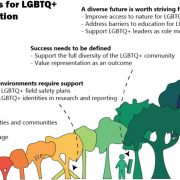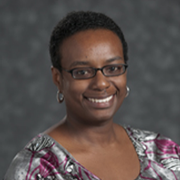It’s not about who you know, but how to find them
Growing up as an LGBTQ+ person in the UK, my experience has come down to one thing: surrounding myself with the right people. While it’s no longer illegal, the undercurrent of intolerance towards LGBTQ+ people is still strong. What’s important is surrounding yourself with the right people. From my experiences, I have compiled a list of pros and cons to living in the UK as an LGBTQ+ person, in the hopes of showing how I found my community and how I’m starting to build on it.
Con: Stealthing around new people.
Stealthing means moving cautiously into a situation in order to avoid detection. It’s like when you meet a new dog for the first time. You cautiously put out your hand and let them sniff it. If they wag, you go towards them and if they growl, you leave them alone. I’ve found it’s the same with new people, except I don’t offer my hand for them to sniff. I instead dress in a typical gender affirming way and use gender neutral terms to refer to my partner. If the person gives me the right signal, I might feel comfortable enough to disclose more about myself to them. If they give me the wrong signal, I run. But what are the right signals?
Pro: Being LGBTQ+ in the UK is legal.
I had to put this in because I hear it a lot, mostly in conversations about why we no longer need Pride Month. Being LGBTQ+ is legal, so we won? True, it is no longer illegal to love the same or other genders or wanting to transition to another gender. Say I reach out to someone, and they gave me a really wrong signal. I am protected by the law and the person would hopefully face repercussions. However, this doesn’t make the dog bite any less painful. Moreover, people have gotten really good hiding their homophobia and so the wrong signals won’t necessarily look like being beaten and yelled out. Instead, they might look more like innocent commonplace slang.
Con: Microaggressions.
Microaggressions are commonplace words used intentionally or unintentionally that are hostile, derogatory, or negative attitudes towards a marginalised group. For example, in the 2010s, it wasn’t uncommon to hear someone say “that’s gay” whenever someone did something that they didn’t like. Growing up around this time, microaggressions towards LGBTQ+ people were commonplace and while I truly believe many of the people I grew up with didn’t intend any harm, what they did was create a hostile environment in which I felt I could not be out around them. At the time, we were children. They had to have learned this behaviour from the people around them. This is why representation from a young age matters, so that children can question adults using terms in this way and make informed decisions about who they are and the environment they want to create around them.
Pro: People want to learn from their mistakes.
Microaggressions hurt and they create a hostile environment but as I’ve gotten older, I have learned that people will make mistakes and they are also willing to learn and change. Do I think most people want to scare others into not expressing themselves? No. I believe that we have gotten so used to using derogatory slang that we no longer see the harm that it can inflict and the environment it can create. Trends change. Words come in and out of favour. And people don’t mind being corrected. If you’ve ever been corrected in the past, bear this in mind. We’re not trying to belittle or insult you, we’re helping you not to hurt others in the future. We respect you enough to want you to have only positive interactions with whoever you meet. The people that I don’t correct are people that I don’t respect enough to help.
Con: The media representation of LGBTQ+ people.
Within the last three years, I have seen more LGBTQ+ representation across TV shows, movies and films than I have for the entirety of my life. Growing up, the representation I had of LGBTQ+ people were Waylon Smithers from The Simpsons, Pleakley from Lilo and Stitch and I’m struggling to think of a third. I could write a whole article and queer-coded villains, so I’ll instead encourage you to dive into that rabbit hole separately. Moreover, when I think about the representation that I got exposed to through adolescence, it was often damaging. Transgender people being portrayed as dangerous or mentally ill, gay couples only finding love following trauma, bisexual women being attention seekers and asexual people just not existing at all. I didn’t want to be queer for a long time because I thought that my life would be full of traumatic experiences and that people wouldn’t understand, so I tried really hard to be straight. I didn’t know I could be queer and happy.
Pro: The LGBTQ+ community.
In the UK, there is a real range of communities but based on my experience, any community that recognises the TQ+ is very loving, welcoming and supportive. Now that I am out and have found my community, I can have discussions with like-minded people about things that matter to me, and I have really found who I am. We recommend LGBTQ+ books, films and shows to each other written by LGBTQ+ people so the representation is tangible. I see representations of my experiences and that is so validating and healing. I no longer feel the desire to act straight and I am not so fragile when I get knocked back because I have a community who supports and cares for me and I know that I can always lean on them for support.
What have I learned on my journey? I’m legally allowed to be who I am, so the trick to finding the right people is caution and discussion. Let the dog sniff your hand and watch their reaction. If they wag, they’re safe. If they take time to process, be patient. If they bite, sue. Look for representation, correct people when they’re wrong and join a community. We’re waiting with open arms for you.
By Beth Nichols (Twitter: @DrBeeNichols | Instagram: @DrBeeNichols)
Dr Bethany Nichols (any/all) is a Computational Biologist and Postdoctoral Researcher at the John Innes Centre, where she is the Stonewall Representative. Bethany uses computer vision and machine learning techniques to extract trait information from plants so that she can study their behaviour under different environmental conditions, in the hopes of improving crop varieties for future climate events. Being demisexual and in a queer relationship, Bethany has learnt that being comfortably out in the UK is all about who you know.









Leave a Reply
Want to join the discussion?Feel free to contribute!